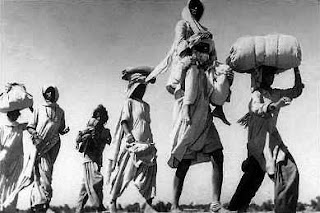What a surprising number of people, even those who are highly sympathetic to Israel, fail to realise, is that the Partition of the Palestine Mandate in 1947-48 has many parallel examples, and is far from unique in modern history. Moreover, the population transfers which occurred there at that time are also far from unique, and for the most part they have never been questioned.
The most obvious precedent for the Partition of Palestine, and the one the British almost certainly had in mind, was the Partition of Ireland in 1922. In that year, Ireland was divided between the Roman Catholic-dominated Irish Free State (now the Republic of Ireland), and the Protestant-dominated Northern Ireland, which remained within the United Kingdom. For decades, the Roman Catholics in the north of Ireland had demanded, first, “Home Rule” for the whole of the island, and then, with the ascendancy of Sinn Fein, complete independence. These goals were, for decades, fiercely resisted by the Protestants of the north.
A civil war in Ireland almost began in 1914, delayed only by the outbreak of the First World War, and then began after the end of that conflict. The division of Ireland into two states has been opposed by Roman Catholics of the south to this day, although most moderates now accept it as a reality. The IRA, however, has never accepted it, and, like the PLO and later Hamas, commenced a terror campaign in the 1960s which culminated in the murders of over 3000 persons. Nevertheless, the Partition of Ireland has been relatively peaceful, and was certainly the only way to end the bitter conflict there.
 |
| Sikhs fleeing the newly-created Pakistan |
It is worth remembering that while in Palestine the Arabs opposed the creation of a largely Muslim Palestinian state, in India it was the Muslims who demanded Partition. Pakistan has no historical foundation whatever, and the very name Pakistan was invented by Muslim students and activists in London in 1931. The Partition of British India in 1947-48 was accomplished by bloodshed on an unimaginable scale, with probably 500,000 deaths in communal violence. Literally millions of Hindus and Muslims living in the “wrong” part of British India left for the other state. Karachi became known as a city of refugees.
Yet – in contrast to Palestine – no one demands the “Right of Return” for these “refugees”, and in any case neither India nor Pakistan would be likely to allow any of their former residents back.
 |
| Sudeten German expellees from Czechoslovakia |
Few people know or care about these events: only in the case of the Palestinians is the issue of Partition and the “Right of Return” being kept alive, nearly 65 years later.

The British in West Africa made an unholy mess there too. By diverting the oil that gushed out of the south, up to the north, thousands of miles away to their beloved muslims. That mess has never been cleared up either!
ReplyDeleteThank you for posting another great article, in both content, as well as a visually appealing page.
ReplyDeleteThanks, Juniper & Love of the Land.
ReplyDeleteLove of the Land, I appreciate the comment re the visual content of the page - I revamped the sidebar recently.
Thanks for the excellent article. I had totally forgotten about Czechoslovakia
ReplyDeleteI had also intended to comment a few days back about the great graphics, usually blog pages are plain and dull
Yes, it's easy to forget about Czechoslovakia, Shirl in Oz. Thanks too for the feedback on the design - I love colour and pictures!
ReplyDeleteA more recent (1974), and -- because of the refugees' claim to a "right of return" and the legal precedent -- more relevant case is that of the Greek refugees in Cyprus. The European Court of Human Rights ruled that "the passage of time [35 years cf. 65 for the Palestinians] and the continuing evolution of the broader political dispute" made "return" neither practical nor desirable.
ReplyDeletehttp://korbelsecurity.wordpress.com/2010/03/16/european-court-of-human-rights-on-right-of-return-for-refugees/
Many thanks for that useful piece of information.
ReplyDelete